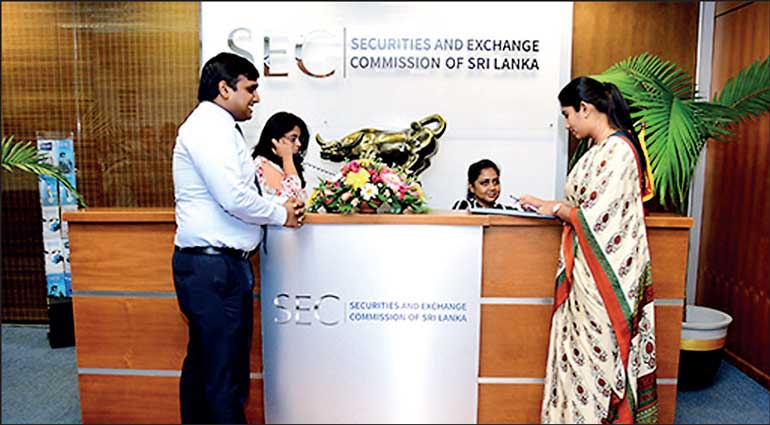Sunday Feb 22, 2026
Sunday Feb 22, 2026
Wednesday, 8 December 2021 00:00 - - {{hitsCtrl.values.hits}}

Sri Lanka is now at a critical stage in managing its economy. However, we need to be conscious of the fact the foreign investors are not going to rush into deals and investments until a proper due diligence is done by them. Listed companies need to upgrade compliance with corporate governance and compliance rules and reporting standards and ensure that Sri Lanka does not become a haven for money launderers
 The new Securities and Exchange Act 19 of 2021 replaced the previous one that had been in existence since 1987 with minor amendments introduced periodically. The new Act has some 189 sections compared to less than 50 provisions in the previous legislation. A new comprehensive Act was long overdue. The Preamble to the new Act states thus:
The new Securities and Exchange Act 19 of 2021 replaced the previous one that had been in existence since 1987 with minor amendments introduced periodically. The new Act has some 189 sections compared to less than 50 provisions in the previous legislation. A new comprehensive Act was long overdue. The Preamble to the new Act states thus:
“An act to establish the Securities and Exchange Commission of Sri Lanka; to regulate market institutions, certain public offers of securities, market intermediaries; to protect investors and to provide for enforcement measures; to deal with market misconduct; and to overcome the challenges encountered by securities market regulators and to repeal the Securities and Exchange Commission of Sri Lanka Act, No. 36 of 1987 and for matters connected therewith or incidental thereto.”
What is of concern to market participants and directors is that the new legislation has provided for very heavy penalties, e.g. fine of not less than Rs. 10 million or imprisonment or a term not exceeding 10 years or both. Any person who abets or conspires is also punishable in the same manner. Offences triable upon indictment by the High Court is a welcome departure from the previous practice of going before a Magistrate.
Prosecutions will be instituted and conducted by the Attorney General. The new Act also provides for civil action within a six-year prescriptive period. Most of the offences cannot be compounded – except on very rare occasions, the SEC has always compounded cases in the past and not a single market participant or company director has ever served a jail sentence.
The Act sets out in detail several offences such as insider trading; market manipulation; false trading; market rigging; securities fraud; false or misleading statements; fraudulently inducing persons to deal in securities; use of manipulative and deceptive devices, etc. These are not entirely new offences in the securities field but the formulation and the extent of coverage of acts and omissions are different.
Some of the requirements and penalties are draconian by any standard. The SEC will emerge as an omnipotent agency, perhaps second only to the Central Bank, if at all. At a recent seminar, Dr. Aritha Wickramanayake, a former DG of the SEC, remarked that if he is given a choice of either being God or Chairman of the SEC he will definitely choose the latter option, the more powerful of the two!
Lord Acton once remarked that ‘power corrupts and absolute power corrupts absolutely’. However, given the composition and attitude of the current Commission and Secretariat there is no doubt that they will use their powers judiciously and in moderation but experience from some other jurisdictions indicate that power can be misused or abused by wrong people in wrong positions.
After the new Act came into force, certain directors have expressed a desire to get guidance as to how they can avoid breaching the laws and regulations. Often, legal advice is sought after the event which makes it difficult to find some justification or circumstances that would help to mitigate the gravity of the infringement.
The rest of this article contains a list of 25 guidelines developed on the basis of training programmes conducted by the author and an analysis of case law from different jurisdictions that might help directors to avoid pitfalls. The guidelines are necessarily generic in nature and need to be adapted to different situations and legal contexts.
A list of 25 guidelines
1. Know your staff, colleagues and suppliers. Pay special attention to red flags which might indicate a tendency to engage in misconduct or non-professional conduct. It is important to know whom you are dealing with and their background.
2. Take extra care outside the office. At social events drink in moderation and avoid discussions of sensitive topics. When you leave office see that you switch off your computer and always use a paper shredder if price sensitive information is contained in any printed documents. Extra data protection precautions must be taken if you are going to be away from office for a few days.
3. Identify sensitive non-public information. Arrange with your compliance/legal teams to organise awareness training programmes for staff and third parties such as regular suppliers to ensure that both employees and suppliers are aware of as to what they are legitimately allowed to share with others to prevent unlawful disclosure.
4. Whistle blower protection scheme. Have a robust scheme. Genuine tips and information must be rewarded whilst protecting identity.
5. Black-out periods. During times when price sensitive information is being contemplated, traders should avoid price sensitive transactions based on imminent developments.
6. Mandatory time-off. Periodically arrange for those who are generally privy to price sensitive information to be sent on paid leave. Persons who are given acting appointments must check whether there are effective ‘Chinese Walls’ and information security systems in place.
7. Promptly report any concerns. All employees should promptly report any insider trading, unlawful disclosure, or market manipulation concerns to their manager, HR, or the compliance team. Serious issues must be escalated to the senior management and/or CEO.
8. Probe and document the work history of job candidates. This evidence will be invaluable if suspicious activity is discovered later (for example, if a trader trades stock of a company owned by a business school acquaintance).
9. Watch out for irregular trading patterns. Be vigilant about trades that fall outside normal buying patterns as they may indicate suspicious activity. The company secretary, treasury management personnel or risk manager must keep an eye on trading patterns that might indicate, for instance, an imminent hostile take-over bid.
10. Time is of essence and pay due attention to calls during busy hours. An unguarded statement might by a signal to current and prospective investors. Interviews which are to be published are best pre-reviewed (even though some journalists will not agree). Send corrections promptly.
11. Sharing information. Refrain from ever disclosing non-public price sensitive information to outsiders. This includes, but is not limited to, details about takeovers, mergers, earnings, profit, change of CEOs, warnings, litigation, or security offerings.
12. Don’t recommend or induce based on inside information. It is an offence to deal or attempt to deal in financial instruments or recommend or induce another person to transact based on inside information.
13. Be extra cautious in informal or social settings. Overlapping work relationships where staff socialise with former colleagues in other firms create the risk of sharing improper information.
14. Employ a well trained and experienced compliance officer.
15. Record-keeping is a must – if you dissent from the majority view ensure that the minutes clearly record your dissent.
16. periodically check compliance reports submitted to the board and committees and clarify any delays or ambiguities.
17. If you authorise necessary action for due compliance but nevertheless a contravention takes place without your knowledge and contrary to the systems in place that could be a useful defence.
18. In case of doubt, call for clarification from the in-house legal team, compliance officer, regulator or private counsel.
19. Know your responsibilities onboarding and follow refresher courses.
20. Ensure beneficial ownership is identified, KYC documents are in order and proper due diligence is conducted at all times.
21. Reliance on a fellow director is not necessarily a valid defence as every director is required to be familiar with basic concepts in reporting financial matters.
22. Due compliance with deadlines is a must.
23. Ensure that board papers are submitted well ahead of time of meetings and discourage need for supplementary papers to be circulated during meetings, unless absolutely essential.
24. ‘Regulator is not God’ – if circumstances force you, have recourse to the judicial system to challenge decisions.
25. Make representations through trade associations when consultation papers are issued by the regulator.
The above list of guidelines is not necessarily exhaustive but hopefully it will be useful to the community of directors and compliance officers.
Sri Lanka is now at a critical stage in managing its economy. However, we need to be conscious of the fact the foreign investors are not going to rush into deals and investments until a proper due diligence is done by them. Listed companies need to upgrade compliance with corporate governance and compliance rules and reporting standards and ensure that Sri Lanka does not become a haven for money launderers.
(The writer is former DG and Chairman of the SEC and Insurance Board of Sri Lanka. He can be reached via email [email protected])